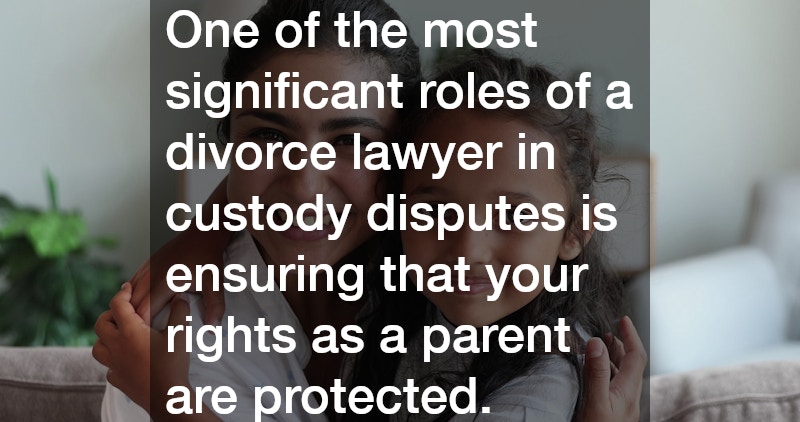Divorce is rarely simple, but when children are involved, the process becomes even more complex. In high-conflict custody battles, emotions often run high, and disputes over parenting time, decision-making authority, and child support can become contentious. During these challenging times, a divorce lawyer plays a critical role in safeguarding your parental rights and ensuring that the child’s best interests remain at the forefront of legal proceedings. Understanding how a divorce lawyer supports you in high-conflict custody cases can help you prepare for what lies ahead and give you the tools to navigate this difficult process effectively.
Understanding High-Conflict Custody Cases
Not every divorce leads to conflict, but some circumstances make disputes over custody especially heated. Factors such as disagreements over parenting styles, accusations of neglect or abuse, or disputes about relocation can escalate tension.
In these cases, both parties may strongly believe they know what is best for their children, leading to ongoing disputes that require court intervention.
A divorce lawyer helps parents identify which issues are legal matters versus emotional concerns, keeping the focus on what the court will prioritize—ensuring the child’s physical, emotional, and psychological well-being. By doing so, your lawyer becomes not only your legal advocate but also a steady guide during what may feel like a turbulent time.
How a Divorce Lawyer Protects Your Parental Rights
One of the most significant roles of a divorce lawyer in custody disputes is ensuring that your rights as a parent are protected. Without skilled representation, you may risk losing valuable time with your child or influence over important decisions regarding their upbringing.
Your lawyer will:
-
Gather evidence that demonstrates your commitment to your child’s welfare, such as school involvement, medical care, and stable living conditions.
-
Present your case persuasively in court, making sure the judge understands your parenting strengths and why your proposed custody arrangement benefits the child.
-
Counter allegations or accusations, which are unfortunately common in high-conflict divorces. If the other party makes claims of neglect or unfitness, your lawyer will respond with evidence to refute them.
Navigating Complex Custody Issues
High-conflict custody battles often involve complex issues beyond just parenting time. For example, disputes may arise over which school the child should attend, which parent makes medical decisions, or whether relocation is permissible. These cases often require careful negotiation or even trial litigation to resolve.
A divorce lawyer provides clarity by explaining legal standards like “the best interest of the child” and how courts evaluate these factors. They also coordinate with experts, such as child psychologists, teachers, or social workers, whose testimony may support your case. By managing these complexities, your lawyer ensures that you are not overwhelmed by the intricacies of family law and court procedures.
Mediation vs. Litigation: Knowing When to Fight
In many custody disputes, mediation is encouraged to help parents reach agreements outside of court. However, in high-conflict situations, mediation may fail if one party is unwilling to compromise or if there are concerns about power imbalances, intimidation, or safety.
A divorce lawyer can advise whether mediation is worth attempting or if litigation is the better path forward. If the case goes to trial, your lawyer is prepared to present a strong argument, backed by evidence and legal precedent, to advocate for your child’s well-being and your rights as a parent.
Emotional Support and Objectivity
While a divorce lawyer is not a therapist, their role often extends beyond legal guidance. In custody battles where emotions run high, having an objective professional on your side can help you make sound decisions rather than reacting impulsively. Your lawyer will remind you to focus on long-term outcomes rather than short-term frustrations, keeping your child’s best interests central to every choice.
This objectivity can make the difference between escalating conflict and finding a resolution that works for both parents while minimizing trauma for the child.
The Child’s Best Interests Come First
Ultimately, custody battles are not about which parent “wins” but about what arrangement best supports the child’s development and stability. A divorce lawyer ensures that your case is framed in a way that demonstrates your ability to provide a nurturing and secure environment. Courts evaluate factors such as parental involvement, consistency, financial stability, and emotional support, all of which your lawyer will highlight in your favor.
High-conflict custody battles are among the most stressful experiences a parent can face, but you don’t have to go through them alone. A divorce lawyer provides essential support by protecting your parental rights, navigating complex legal issues, and ensuring that the child’s best interests are prioritized throughout the process. From gathering evidence and responding to accusations to representing you in court, your lawyer serves as both advocate and guide during a difficult chapter in your life.
When emotions run high and the stakes involve your relationship with your children, having an experienced divorce lawyer by your side is not just helpful—it’s essential. Their knowledge, objectivity, and commitment can help you achieve a fair custody arrangement and give your child the stable, supportive future they deserve.

